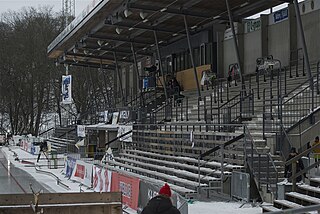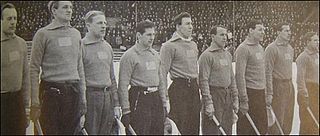
Bandy is a winter sport and ball sport played by two teams wearing ice skates on a large ice surface while using sticks to direct a ball into the opposing team's goal.

The Bandy World Championship is a competition for the men's teams of bandy-playing nations. The tournament is administrated by the Federation of International Bandy. It is distinct from the Bandy World Cup, a club competition, and from the Women's Bandy World Championship. A Youth Bandy World Championship also exists separately from the senior competition and has competitions in both the male and female categories.

The Soviet Union national bandy team represented the Soviet Union in bandy. It was controlled by the Federation of bandy and field hockey USSR. Even if bandy was a popular sport domestically in the 1920s and 1930s, the Soviet Union did not compete in any internationals back then. Agreements were made to play friendlies against Sweden in the late 1940s, but the plans did not come to realization. However, after having seen Finland, Norway and Sweden playing bandy at the Winter Olympics in Oslo in 1952, the Soviet Union invited these three countries to a four nation bandy tournament in 1954. This was the first time a Soviet national bandy team met other national bandy teams. The four countries used somewhat different rules prior to this tournament, but the rules were adjusted to be the same for the future.

The Sweden national bandy team represents Sweden in the sport of bandy. There are two separate national teams, a national bandy team for men, and a national bandy team for women. This article deals chiefly with Sweden's national men's bandy team.

The Russia national bandy team represents Russia in international bandy. There is a national team for men's competitions and a Russia women's national bandy team. This article deals chiefly with the men's national bandy team.

The Finnish national bandy team has taken part in all the Bandy World Championships for men since the competition was launched for the first time in 1957. Finland won the championship title in 2004. They have always finished in the top four, and have won 28 medals in 36 championships.

The Federation of International Bandy is the international governing body for the sport of bandy, including the variant called rink bandy. The federation is headquartered in Simrishamn Municipality, Sweden.
Norway national bandy team represents Norway in the sport of bandy. The country has both a men's national team and a women's national team. This article deals chiefly with the men's national team.

The 2004 Bandy World Championship was a competition among bandy playing nations. The men's tournament was played in Sweden on 1–8 February 2004 for Group A and Group B was played at the City Park Ice Rink in Hungary on 25–28 February 2004. Finland won the championship for the 1st time. Eleven bandy playing countries participated in the 2004 championships: Finland, Kazakhstan, Norway, Russia, Sweden and Belarus, Canada, Estonia, Hungary, Netherlands and United States.

The 1991 Bandy World Championship was contested by eight men's bandy playing nations in Finland from 17–24 March 1991. Canada, Hungary and the Netherlands made their championship debuts. The Soviet Union became champions in what would become its last tournament; less than a year later, the Soviet Union was dissolved and would be replaced in international bandy briefly by the Commonwealth of Independent States and then permanently by Russia. The final game was played at Oulunkylä Ice Rink in Helsinki.

The 1989 Bandy World Championship was the 16th Bandy World Championship and was contested by five men's bandy playing nations. The championship was played in the Soviet Union from 29 January to 5 February 1989. This was the first ever indoor championships, held at the Olympic Stadium in Moscow, except for two matches in Krasnogorsk. The Soviet Union became the champion.

The 1979 Bandy World Championship was contested among four men's bandy playing nations. The championship was played in Sweden from 27 January-4 February 1979. Soviet Union, who remained unbeaten through the tournament, became champions.

The 1977 Bandy World Championship was the tenth Bandy World Championship and was contested by four men's bandy playing nations. The championship was played in Norway from 23–30 January 1977. The Soviet Union became champions.

The 1975 Bandy World Championship was the ninth Bandy World Championship and was contested by four men's bandy playing nations. The championship was played in Finland from 25 January-2 February 1975. The Soviet Union became champions.

The 1973 Bandy World Championship was the eighth Bandy World Championship and was contested by four men's bandy playing nations. The championship was played in Moscow and Krasnogorsk on February 17–24, 1973. The Soviet Union won the championship.

The 1969 Bandy World Championship was the sixth Bandy World Championship and was contested by three men's bandy playing nations. The championship was played in Sweden from 8–16 February 1969.

The 1965 Bandy World Championship was the fourth Bandy World Championship and was contested by four men's bandy playing nations. The championship was played in five cities of the Soviet Union on February 21–27, 1965. The Soviet Union became champions.

The 1957 Bandy World Championship was contested among three men's bandy playing nations and was the first ever Bandy World Championship. Norway declined to take part due to the Soviet invasion of Hungary in November 1956.
Bandy was held as a demonstration sport at the 1952 Winter Olympics in Oslo. A men's program was included but not a women's program.
Bandy Playing Rules is the name of the rule book for bandy, edited by the Federation of International Bandy. The rule book is available online. The current book was adopted in September 2013.
 Soviet Union -
Soviet Union -  Finland 2-1 (0-1), Moscow, Soviet Union
Finland 2-1 (0-1), Moscow, Soviet Union  Sweden -
Sweden -  Norway 4-0 (1-0), Moscow, Soviet Union
Norway 4-0 (1-0), Moscow, Soviet Union  Soviet Union -
Soviet Union -  Norway 8-0 (6-0), Moscow, Soviet Union
Norway 8-0 (6-0), Moscow, Soviet Union  Sweden -
Sweden -  Finland 4-4 (3-2), Moscow, Soviet Union
Finland 4-4 (3-2), Moscow, Soviet Union  Finland -
Finland -  Norway 2-0, Moscow, Soviet Union
Norway 2-0, Moscow, Soviet Union  Sweden -
Sweden -  Soviet Union 2-1 (2-1), Moscow, Soviet Union
Soviet Union 2-1 (2-1), Moscow, Soviet Union 















